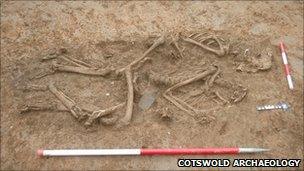Archaeological dig uncovers Roman activity near Stroud
- Published

One of the most notable finds was a double burial with two skeletons closely flexed together
A study has begun into items found in an archaeological dig near Stroud.
The excavation at a site at Ebley Road in Stonehouse has revealed evidence of some of the earliest Roman activity known in the Stroud Valleys.
A large rectangular enclosure dating back to the 1st Century was found and more than a dozen human skeletons were unearthed from it at the end 2010.
Cotswold Archaeology's Cliff Bateman said the findings showed how densely populated the area was in Roman times.
The archaeological dig at Foxes Field was carried out ahead of a new housing development at the site.
Evidence was also discovered of late Neolithic/early Bronze Age and late Iron Age activity, including a tree throw (a bowl-shaped cavity created in the subsoil) containing at least four drinking vessels which date from 2600 BC to 1800 BC.
Post-excavation work, including washing, dating and analysis of the discoveries, has now begun at Cotswold Archaeology's base at Kemble.
Project manager Cliff Bateman said: "Most of our work is undertaken in advance of developments such as this but are usually undertaken throughout the whole of the country, so to work locally in the Stroud Valleys was obviously exciting.
"We previously knew of the Roman settlements at Standish, Frocester and Eastington as well as the famous mosaic at Woodchester, so the current findings continue to show how densely populated the local area was in the Roman period."
Thirteen human burials were excavated within the Roman enclosure at Ebley Road in Stonehouse.
Archaeologists said one of the most notable burials was a grave that contained the skeletons of two individuals which were closely flexed together, and the discovery of a number of iron nails around the edge of two of the graves, suggesting the bodies were buried inside coffins.
One of the burials contained a coin dating back to AD 324-30, which was found near to the mouth area.
Experts say it was customary to place a coin in the mouth of an inhumation as a fare for the ferryman Charon for safe passage across the River Styx in the afterlife.
A full study into the objects found is due to take a year to complete, and the finds will be donated to the Museum in the Park in Stroud.
The human remains will be reburied locally.